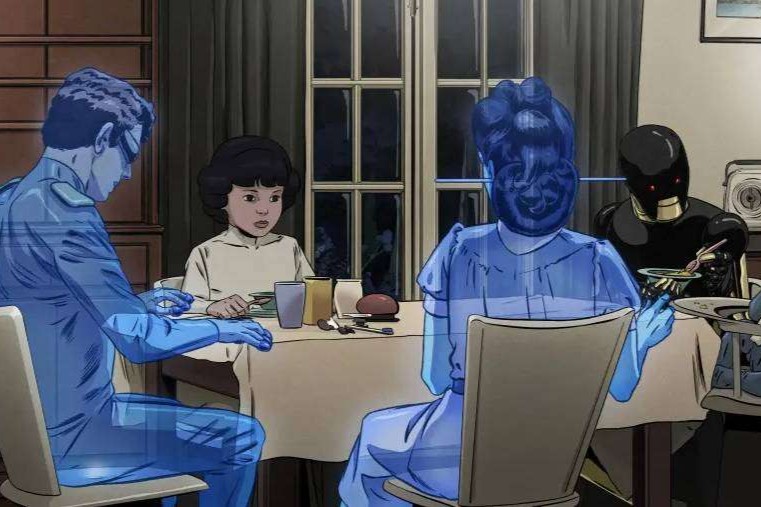Winning the Cristal for best feature film at the 2025 Annecy International Animation Festival, Ugo Bienvenu’s debut Arco arrives at this year’s French Film Festival like a burst of colour, a film as bright and shifting as a rainbow after rain.
Produced by Félix de Givry, Sophie Mas, Natalie Portman and Bienvenu, Arco follows its ten year old titular protagonist in the year 2932, an era where human beings wear rainbow caps that let them fly through the air and slip through time itself. Arco longs to travel to the past to see dinosaurs, but his parents refuse to hear him, brushing aside his desire before he can even finish his sentence. Hurt and determined, he decides to use the rainbow without telling anyone and accidentally travels not to the prehistoric past but to the year 2075. There he meets Iris, a girl who takes care of her baby brother Peter with the help of Nanny Robot Mikki, while her own parents are forever away for work.
As Arco tries to find his way back to the future, the journey widens to include Iris, Peter, Mikki, Iris’s friend Clifford and three peculiar men with rainbow tinted sunglasses named Dougie, Stewie and Frankie. Their little group blossoms into a travelling constellation shaped by accident and longing.
Within its eighty two minutes, Arco carries many concerns inside its luminous shell. It is a tale about the environment, first showing Arco’s distant future where most of Earth sleeps underwater and humans live on huge platforms, then revealing Iris’s 2075 where storms, wildfires and protective shields define daily life. The film also observes a society where automation has seeped into every corner of daily life, with robots teaching, caring and policing. Rather than diving into dark prophecy, the film stays gentle, exploring the complexity of these machines and how their presence shapes connection and care. Both time periods carry the same quiet ache: humans have drifted far from the natural world that once held them.
Yet, beneath all its futurism, the film is most deeply about generations failing to hear one another. Every thread of the plot begins with the same wound. Parents who will not listen. Parents too busy to arrive. Parents who refuse to believe what their children tell them. Arco runs away because his parents shut him down. Iris grows up in the shadow of parents who are always a voice on a screen. Even the three peculiar men became peculiar because no adult ever trusted their truth. The children carry the weight of disbelief, and the story becomes a quiet plea for tenderness between generations.
Arco weaves these elements together with remarkable grace. Yet this fullness can also strain against the film’s short running time. Some of the most emotional moments arrive with force rather than with the slow bloom that might make them feel entirely earned. In the final stretch, when the story reaches for tears again and again, the pace can feel hurried, especially in the arc involving Mikki. The moments that echo Interstellar and WALL-E are beautiful and moving, yet the film has not spent quite enough time laying the ground beneath that heartbreak. The moment shines, but the path to it feels rushed.
The two future eras, separated by eight centuries, offer a clever way to speak about environment and memory, yet not all details align convincingly. The environmental message remains moving, but the scale of change across eight hundred years feels more symbolic than critical. More importantly, the film only hints at how this journey shapes the coming of age of its two protagonists, especially their relationship with the natural world, and this feels unconvincing given the eight centuries that separate their worlds and the way those changes are imagined.
Still, Arco remains a luminous film, radiant with imagination and colour. Its beauty lies not only in its futuristic visions but in its yearning for family, for listening, for the fragile connections that stretch between generations. It is a rainbow shaped story about the worlds we inherit, the worlds we lose and the worlds we might someday choose to build.
Screened as part of French Film Festival


Comments